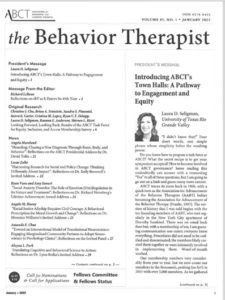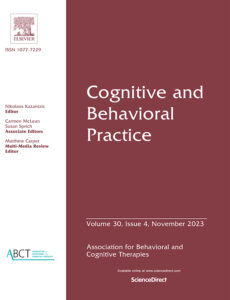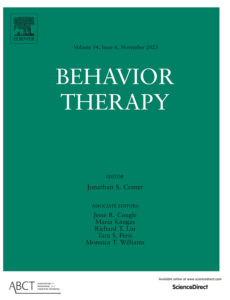Find a CBT Therapist
Search through our directory of local clinicians.
ABCT Journals
Welcome to ABCT Journals
Your membership in ABCT entitles you to online access to both Behavior Therapy and Cognitive and Behavioral Practice. Print versions are also available for an additional fee. You also receive print copies of the Behavior Therapist and can also access it from our archived PDFs.
the Behavior Therapist Journal

Cognitive and Behavioral Practice Journal

Behavior Therapy Journal

Call for Papers
The Use of Psychedelics in Cognitive Behavioral Therapy and Practice
Cognitive and Behavioral Practice
An innovative and expanding area of research is examining the synergistic relationship between psychedelic medicines and evidence-based psychotherapies. These treatments offer the potential of enhancing therapeutic outcomes for a broad range of mental health challenges.
Guest editors:
Leslie A Morland, PsyD, is a Professor of Psychiatry at the University of California, San Diego and Senior Researcher at the National Center for PTSD, Women’s Health Sciences Division, and a Psychologist the Veterans Affairs San Diego; [email protected].
Chris Stauffer, MD is an Associate Professor of Psychiatry, Oregon Health & Science University, and a Physician-Scientist at VA Portland Health Care System; [email protected].
Chandra Khalifian, PhD is an Assistant Professor of Psychiatry at University of California, San Diego and a Psychologist at Veterans Affairs San Diego; [email protected].
Kayla Knopp, PhD is an Assistant Professor of Psychiatry at University of California, San Diego and a Psychologist at Veterans Affairs San Diego; [email protected]
Special issue information:
Psychedelic medicines, including classic psychedelics and empathogenic compounds, may potentiate current mechanisms of change in cognitive behavioral therapies (CBTs). Shared effects of psychedelics include increased cognitive flexibility, empathy and a sense of connection, and reduced avoidance of thoughts and feelings, which map onto goals of CBT including shifting dysfunctional cognitions, engaging in prosocial behavioral changes, and improving emotion regulation. Emerging clinical and research efforts have found support for using psychedelic compounds such as psilocybin, and 3,4-methylenedioxymethamphetamine (MDMA) in conjunction with CBTs to treat a number of mental health conditions, yet the existing literature has not emphasized using gold-standard, evidence-based psychotherapies as part of these treatments. Despite the growing research base and widespread interest, many gaps remain in our practical understanding of the possible benefits, risks, and best approaches for integrating psychedelics with evidence-based CBTs.
The goal of this special issue in Cognitive and Behavioral Practice is to bring together a series of papers that highlight expertise and clinical knowledge that can be useful for clinicians interested in learning about the synergistic integration of psychedelic administration within established CBT frameworks. We are interested in highlighting novel approaches that pair classic and non-classic psychedelics with CBTs.
C&BP is a practitioner-oriented journal that publishes research reports (in the context of rich clinical descriptions), case series and studies, clinical commentaries, treatment development reports, and reviews. All submissions must follow the unique C&BP submission guidelines: https://www.elsevier.com/journals/cognitive-and-behavioral-practice/1077-7229/guide-for-authors
Topics may include:
- Development and rich description of clinical models (individual, group and couples) that detail how to integrate psychedelics with evidence-based cognitive behavioral oriented psychotherapies across a range of populations and diagnostic presentations.
- Case series or studies that illustrate the unique ways psychedelic medicines may potentiate existing CBTs.
- Clinical commentaries on why certain psychedelics might serve as better enhancers for certain CBTs or diagnostic presentations (e.g., ketamine for suicide and depression, MDMA for PTSD and social anxiety, etc.)
- Pilot studies, case series/studies, or reviews with case illustrations showing the impact of psychedelics and CBT on clinical outcomes including functioning, recovery, and wellbeing beyond clinical diagnoses and symptom change.
Manuscript submission information:
Those manuscripts selected for further consideration will be peer reviewed and published online if accepted. We will strive to provide editorial decision letters within one week of completed submission. Authors will be expected to revise manuscripts promptly.
The deadline for submissions is July 1, 2024. Those manuscripts selected for further consideration will be peer reviewed according to the journal’s usual editorial policies and procedures. Authors will be expected to revise manuscripts promptly. Accepted articles will be posted online within a short time frame of acceptance. Authors or author groups with questions about potential submissions are invited to contact the Guest Editor team identified above. For initial inquiry please contact Leslie Morland at [email protected].
Learn more about the benefits of publishing in a special issue.
Interested in becoming a guest editor? Discover the benefits of guest editing a special issue and the valuable contribution that you can make to your field.
Journal Editors Directory
Search the Journal Editors Directory
Journal Support
Journal access is automated through your login to the ABCT.ORG website. Once you have logged into the site, you can click on the links to the individual journals.
Once at the journal site, you may personalize your experience by providing your email address.
Should you require any assistance, please do not hesitate to contact the closest Customer Support department as follows:
Customers in North, Central, and South America should contact:
Telephone: 1-888-615-4500
(+1 212-462-1978 if calling from outside the USA and Canada)
Fax: +1 212-633-3680
E-mail: [email protected]
Customers in Europe, The Middle East and Africa should contact:
Telephone: +31 20 485 3767
Fax: +31 20 485 3432
E-mail: [email protected]
Customers in Asia Pacific including Australia (except Japan) should contact:
Tel: +65 6 349 0222
Fax: +65 6 733 1510
Email: [email protected]
Customers in Japan should contact:
Telephone: +81 3-5561-5034
Fax: +81 3-5561-5047
E-mail: [email protected]
My Account Info
Manage your Membership information, email preferences, and more.
Journals
Membership in ABCT grants you access to three journals.
Convention
We are now accepting Abstract submissions for Continuing Education Ticketed Sessions at the 2024 ABCT Convention in Philadelphia, PA.
My Account Info
Manage your Membership information, email preferences, and more.
Journals
Membership in ABCT grants you access to three journals.
Convention
We are now accepting Abstract submissions for Continuing Education Ticketed Sessions at the 2024 ABCT Convention in Philadelphia, PA.
